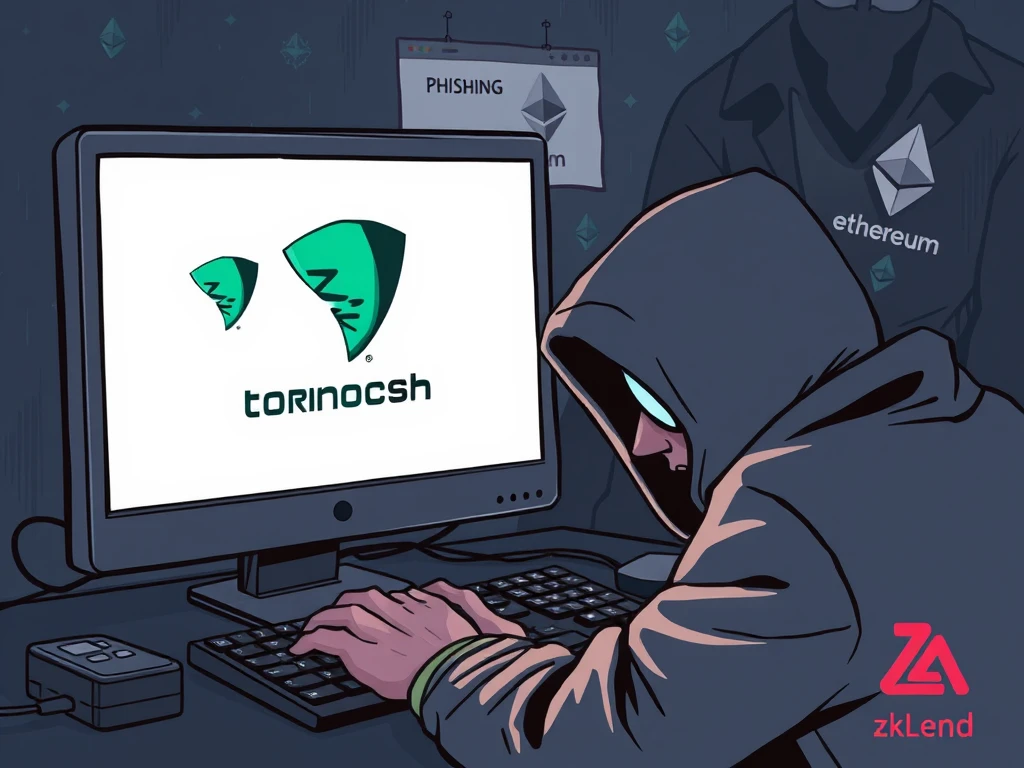Devastated zkLend Hacker Falls Prey to Tornado Cash Phishing Scam, Loses Stolen ETH

In a bizarre twist of fate, the hacker who masterminded the $9.6 million exploit on decentralized lending platform zkLend in February has now claimed to be a victim of a sophisticated phishing scam. According to on-chain messages, this unfortunate turn of events led to the loss of a significant chunk of their ill-gotten gains – a staggering $5.4 million in Ether (ETH). Could this be a case of poetic justice in the crypto world, or simply another cautionary tale of the ever-present dangers lurking in the decentralized finance (DeFi) space? Let’s dive into this incredible story.
zkLend Hacker’s Shocking Claim: A Phishing Fiasco
Just weeks after the audacious zkLend hacker made headlines for exploiting the DeFi protocol, they’re back in the spotlight, but this time as the victim. In a message sent via Etherscan to zkLend on March 31st, the hacker confessed to losing a massive 2,930 ETH. Their downfall? A phishing website cleverly designed to mimic the popular cryptocurrency mixer, Tornado Cash.
The hacker detailed their attempt to launder the stolen ETH through Tornado Cash, explaining they made multiple transactions, each time sending 100 ETH, and finally three deposits of 10 ETH. It was during this process that they unknowingly stumbled upon a fraudulent website. “Hello, I tried to move funds to a Tornado, but I used a phishing website, and all the funds have been lost. I am devastated. I am terribly sorry for all the havoc and losses caused,” the message from the alleged hacker stated.
This message paints a picture of remorse and disbelief, with the hacker further adding, “All the 2,930 Eth have been taken by that site owners. I do not have coins. Please redirect your efforts towards those site owners to see if you can recover some of the money.”
| Event | Details |
|---|---|
| zkLend Exploit | $9.6 million stolen in February |
| Hacker’s Claim | Lost 2,930 ETH (approx. $5.4 million) to phishing site |
| Phishing Method | Fake Tornado Cash website |
Tornado Cash Phishing: A Costly Mistake
The incident highlights the persistent threat of Tornado Cash phishing scams within the crypto ecosystem. These fraudulent sites are designed to look identical to the legitimate Tornado Cash interface, tricking users into entering their private keys or sending funds to attacker-controlled addresses. In this case, the zkLend hacker, despite their technical prowess in exploiting a DeFi protocol, fell victim to a classic phishing attack.
Adding insult to injury, another blockchain user reportedly warned the hacker about their error in real-time, pointing out that they were using a scam URL. The hacker’s reply, “It is so devastating. Everything gone with one wrong website,” underscores the sheer simplicity and effectiveness of phishing scams, even against seasoned crypto users.
The Aftermath: zkLend’s Response and Community Reactions
zkLend’s response to the hacker’s message was direct and pragmatic: “Return all the funds left in your wallets” to the official zkLend wallet address. However, on-chain data reveals that shortly after this exchange, another 25 ETH was transferred to a wallet identified as “Chainflip1,” raising questions about the hacker’s true intentions and the extent of their remaining holdings.
The crypto community’s reaction has been a mix of schadenfreude and concern. Some users have expressed amusement at the hacker becoming a victim themselves, while others have used this incident to reiterate the critical importance of vigilance and security awareness in the crypto space. It serves as a stark reminder that even those operating on the fringes of legality are not immune to basic online scams.
Understanding the zkLend Exploit: A Recap
To fully grasp the context of this bizarre turn of events, let’s briefly revisit the original DeFi exploit on zkLend. On February 11th, the protocol suffered an “empty market exploit.” The attacker leveraged flash loans and a small initial deposit to artificially inflate the lending accumulator. This manipulation allowed them to exploit rounding errors during repeated deposit and withdrawal actions, ultimately draining approximately $9.6 million from the protocol.
Following the exploit, zkLend made a public offer to the hacker: a 10% bounty and freedom from legal repercussions in exchange for the return of the remaining 90% of the stolen funds. This offer, however, expired on February 14th without any public response from the hacker. Subsequently, zkLend increased the pressure, offering a $500,000 bounty for information leading to the hacker’s arrest and fund recovery.
The Broader Landscape of Crypto Scams and Hacks
This incident is a microcosm of the larger problem of crypto scams and hacks plaguing the industry. Recent data from CertiK reveals that losses from scams, exploits, and hacks in February alone exceeded $1.53 billion. While a significant portion of this figure is attributed to the massive $1.4 billion Bybit hack (linked to North Korea’s Lazarus Group), smaller-scale incidents like the zkLend exploit and the subsequent phishing scam contribute to the overall concerning trend.
The vulnerability of even sophisticated actors to simple phishing attacks underscores the need for continuous education and robust security practices across the entire crypto ecosystem. Whether you are a seasoned DeFi user or a newcomer, vigilance remains your strongest defense against the ever-evolving tactics of cybercriminals.
Key Takeaways: Lessons from the zkLend Hacker’s Misfortune
- Double-Check URLs: Always verify the website address before interacting with crypto platforms, especially those involving sensitive transactions like using mixers.
- Bookmark Trusted Sites: Save legitimate website links to avoid accidentally clicking on phishing links in search results or social media.
- Use Hardware Wallets: For significant crypto holdings, hardware wallets provide an extra layer of security against online threats.
- Stay Informed: Keep up-to-date with the latest phishing techniques and scam tactics to recognize and avoid them.
- Be Skeptical: If something seems too good to be true, or if a website looks slightly off, exercise caution and investigate further.
Conclusion: A Cautionary Tale of Crypto Karma?
The story of the zkLend hacker falling victim to a Tornado Cash phishing scam is undeniably ironic and serves as a potent reminder of the inherent risks in the crypto world, regardless of one’s technical skills or intentions. Whether you see it as crypto karma or simply a case of unfortunate oversight, the incident highlights the critical need for unwavering vigilance and robust security practices. In the wild west of DeFi, even the outlaws can become victims. As the crypto landscape continues to evolve, staying safe requires constant learning, skepticism, and a healthy dose of caution.










